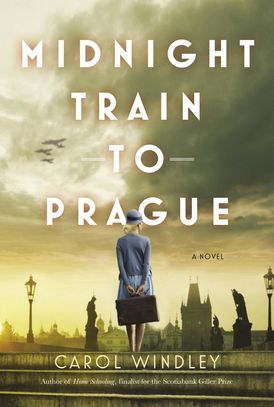
Midnight Train to Prague by Carol Windley
Reviewed in Quill & Quire
May 2020
Publisher: HarperCollins Canada
There is never a shortage of novels centred on the Second World War. Recent titles have tended to favour stories of brave women (real or imagined) taking to the skies as pilots or toiling as resistance fighters or spies. But with its focus on the devastating effects of war on so-called everyday people, Vancouver Island author Carol Windley’s Midnight Train to Prague has more in common with Anthony Doerr’s All the Light We Cannot See than Kate Quinn’s The Alice Network.
Windley – whose short story collections Visible Light and Home Schooling garnered nominations for, respectively, a Governor General’s Literary Award and the Scotiabank Giller Prize – launches her latest narrative more than a decade before the start of the Second World War. The author introduces readers to Beatriz Faber, a wealthy German woman who acts as though she hasn’t a care in the world. Beatriz’s young daughter, Natalia, becomes her mother’s travelling companion after Beatriz pulls her out of boarding school at age 16.
At first the way Windley sets about describing the Fabers’ jet-setting lifestyle seems odd: why do we need to know so much about their privilege and Beatriz’s frivolity? But as the years pass and the author fills in the historical details around the women’s lives, we realize she is setting us up to appreciate the contrast of pre- and postwar experience (at least through the lens of the privileged class).
Beatriz’s wanderlust also provides the opportunity to introduce the other characters who feature most prominently as the story progresses. On a train ride, mother and daughter meet Magdalena Schaefferová, a Czech doctor, and her young son, Franz. While taking treatments in a Hungarian spa town, the Fabers encounter Miklós Androján, a Hungarian count and journalist, and his on-again-off-again love interest, Zita Kuznetsova. Not long after making the latter pair’s acquaintance, Beatriz discards Natalia (leaving a note for her to return to their home in Berlin) and takes off with Zita, a more amenable companion than her long-suffering daughter.
As the years go by and relationships stretch or deepen, depending on distance and interest, Windley paints a picture of comfort, prosperity, and security for her characters. There are shadows, of course, particularly for Miklós, whose life as a roving journalist and experiences in the First World War colour his worldview. It is not until the book’s halfway point that the realities of the new war finally hit home for them all. Windley shifts the action from Germany and Hungary in 1938 to 1941 Prague, where Dr. Schaefferová’s 13-year-old daughter, Anna, takes over as one of the central figures driving the novel toward its conclusion.
Windley does an excellent job of striking a balance between providing historical context and developing her characters. We are carried along through Natalia’s experience as she evolves from put-upon teenager to damaged concentration camp survivor. Her native country (Germany), her adopted country (Hungary), and the country she holds dear to her heart (Czechoslovakia) are all affected in different ways by the war. Anna, meanwhile, watches with shifting combinations of numbness, horror, and denial as her world crumbles around her, loved ones are taken away, and the last remnants of childhood are ripped from her grasp.
It is also interesting to observe the war on the ground in countries other than England or France, which feature so prominently in many other novels centred on the conflict. In Hungary, life continues apace at the Androján country estate where Natalia lives for half the year with Miklós (whom she marries a few years after her mother and his girlfriend pair off ) and her tough-as-nails mother-in-law Rozalia. Until, that is, the nation – which initially marched in lockstep with the Nazis – switches allegiances in 1944 and Germany retaliates with brutal efficiency. Elsewhere, we see the aftermath of Allied bombs on Germany and are presented with the morally freighted choice of feeling empathy for the German citizens left to fend for themselves amid destruction and starvation or vindication that the country that inflicted such suffering across Europe has been brought equally low by the war’s end.
Most intriguing is the glimpse into life in Prague during a time of tumultuous change and upheaval. Created with the amalgamation of Bohemia, Moravia, and Slovakia upon the fall of the Austro-Hungarian Empire in 1918, Czechoslovakia had existed for barely 20 years when the Second World War broke out and its composite parts were divided among Germany, Hungary, and Poland. Though Windley makes clear the Jews of this now non-country bore the worst of the Nazis’ treatment, anti-Slav enmity simmers at a level just slightly below anti-Semitism; no citizen, regardless of race, religion, or Aryan-like appearance, is safe.
While there is certainly a place for wartime fiction that focuses on romance or intrepid female spies, novels like Windley’s offer a deeper, more thought-provoking examination of a time that is on the cusp of slipping from modern memory. As the number of people who lived through the atrocities dwindles, well-written books like Midnight Train to Prague are a reminder to the rest of us that we must never forget.

